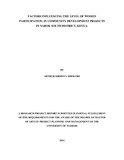| dc.description.abstract | Women and development issues have been on the world agenda since the United Nations organized the first women’s conference in Mexico in 1975. Based on the report done, women are generally not able to participate fully in the development process. Thus, more women are poor, illiterate, do not enjoy proper healthcare, victims of violence such as rape, abuse as well as neglected, denied basic rights, discriminated against and suffer other forms of inequality as though their status is below that of men and their situation is far worse than the men’s. The development of the pastoral regions is faced with a number of challenges. Therefore, the main purpose of the study was to establish the factors that influence the level of participation of women in community development projects. A descriptive survey design was adopted in order to analyze the multiple variables involved. Simple stratified random sampling technique was used to capture the objective of the study population of 21 Community Based Organizations (CBOs) with a total of 441 members. The sample of 43% of the total population was used, which reflects to 189 respondents. Data was collected using structured questionnaires. Pilot test of the measures was conducted against prospective sample population in order to measure validity and reliability. Half-split method was used to measure the validity of the research instruments. A sample size of ten was chosen to form the pilot study, in order to measure the validity and reliability of data collection instruments. Data was presented using tables to make them reader friendly. There were ethical issues related to the study and they were addressed by maintaining high level confidentiality of the information volunteered by the respondents. The data targeted a sample of 189 respondents from which only 181 completed and returned the questionnaires making a response rate of 96.7%. From the study it can be concluded that socio cultural factors, economic challenges, infrastructure and capacity building a major role on low participation of women in community development projects. The government should partner with other organizations to organize more workshops to sensitize the community on the importance of allowing women to participate on development of the community. The community infrastructure needs a major facelift since the world has changed and old means of transport should be replaced with the fast and modern. The water points should also be constructed within the reach of many residents to avoid scenarios of women walking for almost a day in search of water thus impacting negatively on their participation in community development. However there might be other factors that affect/influence women participation in community development project and further study should be done on this. | en_US |



